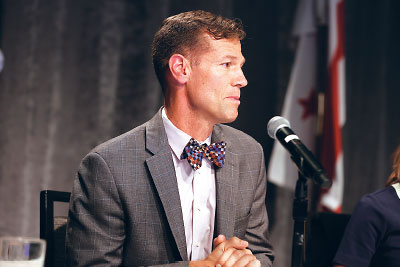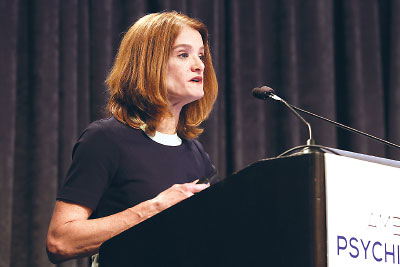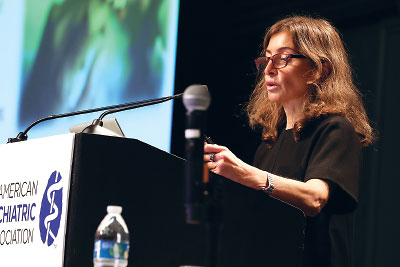Dobbs Decision Threatens Lives, Experts Say
Abstract
The U.S. Supreme Court’s decision in Dobbs v. Jackson Women’s Health Organization interferes with evidence-based care and harms not only pregnant people, but their families.
The U.S. Supreme Court’s decision in Dobbs v. Jackson Women’s Health Organization and the resulting restrictions on abortion services in many states threaten the health and lives of women and children, particularly those in marginalized communities, experts said at an emotionally charged session at APA’s Mental Health Services Conference.
“Let’s just remember for a moment that abortion disproportionately affects people who are not privileged,” said Nicole Huberfeld, J.D., the Edward R. Utley Professor of Health Law, Ethics, and Human Rights and a professor of law at Boston University School of Public Health and School of Law. “People who seek abortions are more likely to be poor and more likely to be people of color.”
Huberfeld said that most of the bans and restrictions on abortion that have taken effect since the decision have been implemented in states that already have high rates of adolescent birth, infant mortality, and maternal mortality.
Huberfeld added that in the months since the Dobbs decision, nearly 70 clinics that provide health care for women beyond abortion services have closed. Additionally, rural hospitals in states that have not expanded Medicaid eligibility under the Affordable Care Act are now more likely to close, and even in the rural hospitals that stay open, the obstetrics units are likely to close, she noted.
“Reproductive justice doesn’t just mean access to abortion, even though that gets all the light and heat,” Huberfeld said. “Reproductive justice means that a person has access to [care for] a safe pregnancy, healthy outcomes in that pregnancy, and a healthy infant once the pregnancy is done. ... We will have maternity care deserts where people simply can’t access the care that they need.”

The Dobbs decision will lead to a decrease in abortion training in states that have outlawed abortion, ultimately resulting in OB-GYNs being less equipped to care for pregnant people, says Jason Baxter, M.D., M.S.C.P.
Jason K. Baxter, M.D., M.S.C.P., a maternal-fetal specialist and a professor of maternal-fetal medicine at Thomas Jefferson University in Philadelphia, discussed the impact the Dobbs decision will have on clinical decision-making and evidence-based medicine. He noted that many of the medications, procedures, and treatments used to treat miscarriages are also used in abortion services.
“Unfortunately providers in states where abortion is legislatively limited or banned are often fearful and may self-limit the miscarriage or ectopic pregnancy care they provide, placing women’s lives at risk,” Baxter said.
Baxter decried claims that the Dobbs decision was made in the name of patient safety.
“The safety of abortion has been extensively documented. The risk of mortality from childbirth is 5 to 100 times higher than the risk from an induced abortion,” he said. “The risk of all maternal mortality, of all maternal morbidities, is significantly higher among women who give birth than among those who have abortions.”
Baxter also spoke of the Dobbs decision’s impact on medical training.
“About half of the OB-GYN and training programs are located in states where abortion is either outlawed or likely to be outlawed. For programs in these states, this will lead to a dramatic decline in abortion training. Trainees may have to leave the state for abortion training, ... participate in simulations, and maximize their natural miscarriage care experience,” Baxter said. “Ultimately, future OB-GYNs will be less equipped to care for pregnant women.”

Denying reproductive rights creates an adverse political determinant of health and mental health, says Nancy Byatt, D.O., M.S., M.B.A.
Nancy Byatt, D.O., M.S., M.B.A., the executive director of the Lifeline for Families Center and Lifeline for Moms Program and a professor of psychiatry at the UMass Chan Medical School, discussed the implications of the decision on maternal and family mental health. She focused on the Turnaway Study, which compared women who were able to receive abortion services with women who were turned away because of gestational limits. The study revealed the reasons why women seek abortion, including that they could not afford to raise a child or another child, there were negative elements in their relationship with the man involved in the pregnancy such as intimate partner violence, and they needed to care for the children they already had.
“When women seek abortions, they do it because they feel it’s best for them and their family,” Byatt said.
She noted that at follow-up five years later, more than 90% of the women who had abortions felt that it was the best decision.
“And they’re right,” Byatt said. “Being denied an abortion is clearly associated with worse outcomes for women and their families. Families fall into poverty, [and] children do not meet developmental milestones. Children born later to women who get an abortion experience more economic security and better maternal bonding, and they are more likely to meet developmental milestones.”
Byatt said that the data are “very clear” about the negative impact of being denied an abortion.
“Being turned away is associated with elevated levels of anxiety, stress, and lower self-esteem [in pregnant people] soon after the denial,” Byatt said. She said that there is no evidence to support claims that abortion causes negative mental health outcomes. “However, there are clear data that abortion stigma is associated with negative outcomes, and if we restrict abortion, we’re going to increase stigma around abortion, [which will then] worsen mental health outcomes.”

Denying abortion to pregnant people who experience intimate partner and other forms of violence will further traumatize them, says Madeleine Becker, M.D., M.A.
Madeleine Becker, M.D., M.A., director of graduate medical education at Thomas Jefferson University, emphasized that many pregnant people who seek abortion services are victims of intimate partner and other forms of violence, with the most extreme cases involving a person who is raped and a perpetrator who faces no legal consequences.
“This will certainly further traumatize women and their children, particularly those at high risk of or already experiencing interpersonal violence or trauma, including reproductive or sexual coercion,” Becker said. She added that the Dobbs decision does not consider that people who seek abortions often have little or no financial resources, live in underserved areas, or may be unable to care for a child owing to mental health or substance use disorders.
“This decision includes no provisions for financial social service or mental health or substance use treatment for the mother or child, and importantly and glaringly excludes the father of the baby from any legal responsibility or health risk,” Becker said. “This movement that purports itself to be pro-life does not consider the negative aspect to the lives of children and their mothers.”
Becker said that restricting or criminalizing physicians and others who may assist in the decision-making or care of a person who seeks an abortion will increase polarization, worsen health disparities, and decrease access to medical care.
“It inserts the government into the patient-physician relationship, violating patient and physician rights to receive and practice evidence-based medical care. It allows government intrusion into clinical decision-making, it obviates women’s mental health and medical needs simply because they’re pregnant, and it offers no safe solutions to a situation that is simply untenable for many women,” Becker said. ■



